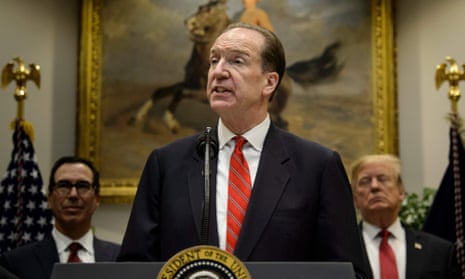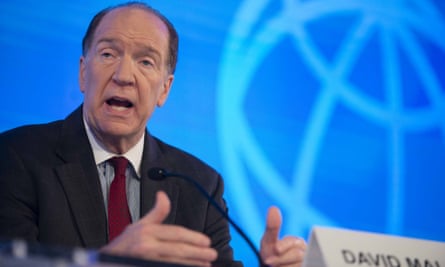World Bank staff were told to give special treatment to son of Trump official
"Exclusive: Leaked recording raises concerns over governance at development bank, at which David Malpass is now president

World Bank staff were apparently told to give preferential treatment to the son of a high-ranking Trump administration official after the US Treasury threw its support behind a $13bn (£10bn) funding increase for the organisation, a leaked recording suggests.
Shared with the Guardian by a whistleblower, the recording of a 2018 staff meeting suggests colleagues were encouraged by a senior manager to curry favour with the son of David Malpass, who is now president of the World Bank but at the time was serving in the US Treasury under Donald Trump.
During the recording, which has left the Washington-based organisation facing questions over standards of governance, staff refer to 22-year-old Robert Malpass as a “prince” and “important little fellow”, who could go “running to daddy” if things went wrong.
Campaigners said the case could undermine the World Bank’s mission, which includes combating the erosion of public trust in civic institutions by promoting good governance.
Staff were apparently told Robert was the son of the undersecretary of the US Treasury, which had played a “beneficial” role in helping the World Bank secure an endorsement for the multibillion-dollar capital injection.
The recordings also suggest it may not have been the first time the international development bank had hired a family member of an important global figure. “Remember we had a ‘prince’ before … that is a subject for happy hour,” a staff member is heard saying.
The World Bank said it could not confirm the contents of the recording, but added it was “both false and absurd” to suggest that there was any connection between an entry-level hire and the multibillion-dollar capital increase.
The findings raise concerns over internal standards at the World Bank Group (WBG), which is governed by high-ranking officials from across its 189 member states, and is holding its spring meeting alongside the International Monetary Fund (IMF) in Washington this week.
It will also raise further concerns over David Malpass’s term as World Bank president. The economist announced his early resignation in February, months after he controversially failed to say whether he accepted that fossil fuels were causing the climate crisis.
Malpass was, in 2018, serving as undersecretary to the US Treasury for international affairs in the Trump administration and had been a staunch critic of multilateral institutions, at a time when the World Bank was seeking approval from the US government for a sizeable increase in the funds available to lend to developing nations.
He took a lead role in the administration’s negotiations over the capital increase, according to numerous reports, but in public comments at the time had made it clear he was sceptical of approving a funding boost without major changes to the way the organisation was run.
US support was crucial for the deal, given the country is the World Bank’s largest shareholder and conventionally holds its presidential post. However, after months of negotiations, Treasury officials secured a series of reforms, and they endorsed the deal alongside other key shareholders in April 2018.
The US Treasury’s role in securing the $13bn capital increase was referred to in the leaked recording.
“We have a prince that is coming, that is joining us, on 16 July,” a senior manager is heard saying a month before Robert Malpass joined the International Finance Corporation (IFC), the commercial-terms lending arm of the World Bank Group that lends to private sector businesses. The IFC was in line for $5.5bn of the funding.
“I want to forewarn all of you this young, bright person is the son of the undersecretary of the US Treasury, which was beneficial for us in getting the capital increase,” the manager adds.
The manager goes on to explain that Robert, recently graduated from Cornell University with an undergraduate degree in economics, needed to be treated like a “very important little fellow” that might otherwise go “running to daddy” if things went wrong.

They noted that David Malpass was a key adviser to the US Treasury secretary, Steve Mnuchin, who “has little or no clue on things”, suggesting World Bank officials saw the senior Malpass as far more influential than the head of the government’s department.
“We need to manage his education and we need to manage the lemon,” the manager said, referring to Robert’s pending role in the department. “So we need to get work out of him, but we also need to make sure that he sees the world.” When asked by a staff member whether Malpass intended to return to higher education at any point, they said: “annoying[ly], he’s probably going to stay a year, or two years, and then he’s going to move to a hedge fund someplace.
“But in those two years we need to make him happy and valuable and we need to teach him and so forth, all right? So that then I can go to his daddy, and then I get some bonus points.”
The recording suggests it may not have been the first time that a job at the World Bank was given to a family member of an important global figure. “Remember we had a prince before … that is a subject for happy hour,” another staff member is heard saying.
The whistleblower who shared the recording said they believed the episode raised concerns about the way the World Bank Group was governed and influenced by its largest member state.
The whistleblower argued: “The US, as the leading shareholder of the Wold Bank Group, is obligated to contribute to better corporate governance of the institution, but failed to do so. Special treatment destroys the morale of employees, especially among those in junior positions who suffer a lack of opportunities of advancement”.
“The incoming president of the World Bank Group must revitalise it by making significant improvements,” they added, putting pressure on Ajay Banga, the US candidate expected to be formally chosen to take up David Malpass’s post after the spring meeting.
The World Bank said it was unaware of any recordings, had no way to confirm whether they occurred, or whether they were accurate transcriptions of what was said.
Nick Dearden, the director of the social justice campaign group Global Justice Now, said the allegations put the World Bank’s reputation at risk, but could spur necessary change.
“The World Bank lectures countries across the world on corruption and good governance, but here are clear signs that money talks within the Bank itself … This will only further erode the Bank’s reputation and legitimacy but also, we can hope, speed up the transition to international institutions which reflects the world we want to build, not the one we need to leave behind.”
David Malpass was appointed to the Treasury role in 2017, and later chosen to run the World Bank in 2019, by Trump.
He initially appeared to criticise the World Bank’s request for more capital, and said he would be looking at whether any of the 100 international working groups and organisations that the US Treasury took part in could be scaled back or even closed down. “Treasury believes that the World Bank currently has the resources it needs to fulfil its mission,” he said in November 2017.
David’s son, Robert, joined the bank’s IFC division in July 2018 as a research analyst. The then 22-year-old had recently completed his bachelor’s degree in economics, after a series of summer internships at firms including Fortress Investment Group, a New York-based hedge fund, the venture capital firm HKS Capital, and family wealth investment advisers The ImPact.
Robert, who is the eldest of four children, subsequently stepped down in March 2019 after his father was appointed president of the World Bank, because of internal rules that do not allow family members to work in the same organisation.
The World Bank said staff rules prevent nepotism and conflicts of interest, and that Robert’s resignation showed that those rules were effective.
After his father became president, the bank’s staff association was asked about how Robert had originally come to be appointed, but no impropriety was found, the World Bank said. It added that the US personally did not end up providing any funding towards the $13bn capital increase, which instead came from other shareholders.
“No one at IFC or the World Bank was subjected to any pressure or influence in the hiring process,” the World Bank Group said in a statement. IFC conducted an open and fair recruitment process for the role of research analyst and followed its standard hiring practices. The criteria for the role were not changed or diminished to accommodate any candidate, and no one was given preferential treatment as a result of any familial relationship.
“It would be both false and absurd to suggest that a single entry-level staff recruitment was in any way related to a multibillion-dollar capital increase agreed by the World Bank’s 189 member countries,” the World Bank said.
The Guardian attempted to contact both David Malpass and Robert Malpass through their employers and social media. They did not respond to requests to comment."
No comments:
Post a Comment